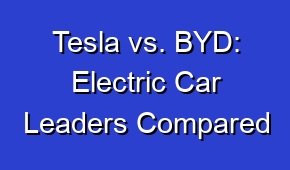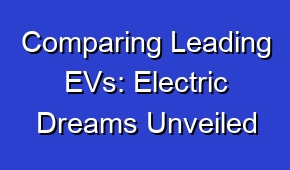Tesla vs. BYD: Electric Car Leaders Compared

Discover the ultimate showdown between electric car leaders: Tesla and BYD. Compare and contrast these industry giants as they compete to revolutionize the automotive world with their cutting-edge technologies and eco-friendly solutions. Uncover the driving forces behind their success and explore the future of electric mobility in this electrifying battle of innovation.
When it comes to electric car leaders, Tesla and BYD are two names that stand out. Both companies have made significant strides in the electric vehicle industry, but they have taken different approaches to achieve their success. Tesla, led by visionary entrepreneur Elon Musk, has focused on luxury electric vehicles with cutting-edge technology and sleek designs. On the other hand, BYD, a Chinese company, has positioned itself as a leader in the electric bus market and has also expanded into other areas such as energy storage and solar power. While Tesla has gained global recognition for its innovative products and strong brand presence, BYD has dominated the Chinese market and is known for its cost-effective solutions. As the demand for electric vehicles continues to grow, the competition between Tesla and BYD will undoubtedly intensify as they strive to maintain their positions as industry leaders.
| Tesla and BYD are two leaders in the electric car industry. |
| Tesla is known for its innovative technology and high-performance electric vehicles. |
| BYD is a Chinese company that focuses on producing affordable electric cars. |
| Tesla has a strong global presence and is recognized as a pioneer in the electric car market. |
| BYD has a significant market share in China and is expanding its presence internationally. |
- Tesla’s electric cars have longer range and faster acceleration compared to BYD.
- BYD offers a diverse range of electric vehicles, including sedans, SUVs, and buses.
- Tesla’s charging infrastructure, known as the Supercharger network, provides convenient long-distance travel.
- BYD’s electric cars are known for their reliability and cost-effectiveness.
- Tesla is investing heavily in autonomous driving technology for its electric vehicles.
What are the key differences between Tesla and BYD electric cars?
Tesla and BYD are two prominent players in the electric car industry, but they have some key differences. One major difference is their geographical focus. Tesla is based in the United States and primarily focuses on the global market, while BYD is a Chinese company that initially focused on the domestic market before expanding internationally.
| Key Differences | Tesla | BYD |
| Market Presence | Global presence with a strong brand image. | Primarily focused on the Chinese market. |
| Range | Offers longer range options for electric vehicles. | Provides a range suitable for daily commuting. |
| Supercharging Network | Extensive supercharging network for convenient long-distance travel. | Limited charging infrastructure outside of China. |
Another difference is their product lineup. Tesla is known for its luxury electric vehicles, such as the Model S, Model X, and Model 3, which target the premium segment of the market. On the other hand, BYD offers a range of electric vehicles, including sedans, SUVs, and buses, catering to different customer segments and needs.
Which company has sold more electric cars: Tesla or BYD?
When it comes to the number of electric cars sold, Tesla has been a clear leader in the market. As of recent data, Tesla has sold millions of electric vehicles worldwide and continues to dominate the global electric car market.
– Tesla
– BYD
On the other hand, BYD has also made significant strides in electric vehicle sales. Being one of the largest electric vehicle manufacturers in China, BYD has sold hundreds of thousands of electric cars domestically and has expanded its presence in international markets as well.
What is Tesla’s approach to charging infrastructure?
Tesla has taken a proactive approach to charging infrastructure to address one of the main concerns of electric vehicle owners: range anxiety. Tesla has developed its Supercharger network, which consists of fast-charging stations strategically located along major highways and in urban areas.
- Tesla has built a network of Supercharger stations that provide high-speed charging for their electric vehicles.
- These Supercharger stations are strategically located along major highways and in urban areas to ensure convenient access for Tesla owners.
- Tesla’s charging infrastructure is designed to enable long-distance travel, with the goal of minimizing range anxiety for electric vehicle owners.
- In addition to Supercharger stations, Tesla also offers Destination Charging, which involves partnering with hotels, restaurants, and other businesses to install charging stations at popular destinations.
- Tesla is continuously expanding and improving its charging infrastructure to support the growing number of electric vehicles on the road and to enhance the overall charging experience for its customers.
The Supercharger network enables Tesla owners to charge their vehicles quickly and conveniently, significantly reducing charging times compared to traditional charging methods. Tesla’s Superchargers are capable of delivering high power levels, allowing for rapid charging and long-distance travel without excessive downtime.
What is BYD’s approach to charging infrastructure?
BYD has also recognized the importance of a robust charging infrastructure and has implemented various strategies to support its electric vehicle owners. BYD offers different types of chargers, including home chargers, workplace chargers, and public chargers.
| BYD’s Approach to Charging Infrastructure | Key Features | Benefits |
| Integrated Solutions | BYD offers a complete range of charging infrastructure solutions, including AC and DC chargers, wall boxes, and charging stations. | Provides a one-stop solution for all charging needs, ensuring compatibility and convenience. |
| Smart Charging Technology | BYD’s chargers are equipped with advanced smart charging technology, enabling efficient charging and optimal power management. | Reduces charging time, maximizes energy utilization, and minimizes energy costs. |
| Scalable and Future-proof | BYD’s charging infrastructure is designed to be scalable and adaptable to future developments in electric vehicle technology. | Allows for easy expansion and integration with emerging technologies, ensuring long-term viability and investment protection. |
BYD has collaborated with governments, businesses, and other stakeholders to establish charging networks in different regions. They have also partnered with utility companies to develop smart grid solutions that optimize energy usage and charging efficiency.
Which company has a stronger presence in the global electric car market?
When it comes to global presence in the electric car market, Tesla has established itself as a dominant player. Tesla’s brand recognition, innovative technology, and extensive Supercharger network have helped it gain a strong foothold in various markets worldwide.
Tesla has a stronger presence in the global electric car market compared to other companies.
While BYD is a significant player in the Chinese electric car market and has expanded its presence internationally, Tesla’s global reach surpasses that of BYD. Tesla has successfully entered multiple markets, including North America, Europe, and Asia, and continues to expand its operations in new regions.
What are the advantages of owning a Tesla electric car?
Owning a Tesla electric car comes with several advantages. One of the key advantages is the long-range capability offered by Tesla’s vehicles. Tesla models are known for their impressive range, allowing drivers to travel longer distances without worrying about running out of battery.
Owning a Tesla electric car offers advantages such as zero emissions, lower operating costs, advanced technology, and a sleek design.
Another advantage is Tesla’s Supercharger network, which provides fast-charging capabilities and convenient access to charging stations. This network enables Tesla owners to plan longer trips with ease and reduces the time spent on charging compared to other electric vehicles.
What are the advantages of owning a BYD electric car?
Choosing to own a BYD electric car comes with its own set of advantages. One significant advantage is the affordability factor. BYD offers electric vehicles at various price points, making them more accessible to a broader range of consumers.
1. Environmental Benefits
– BYD electric cars produce zero tailpipe emissions, reducing air pollution and contributing to cleaner air quality.
– They also help in reducing greenhouse gas emissions, as they do not burn fossil fuels during operation.
– BYD electric cars contribute to the reduction of noise pollution, as they operate quietly compared to conventional gasoline-powered vehicles.
2. Cost Savings
– Owning a BYD electric car can lead to significant cost savings in the long run. Electric vehicles typically have lower operating costs compared to gasoline-powered cars, as electricity is generally cheaper than gasoline.
– BYD electric cars require less maintenance, as they have fewer moving parts compared to internal combustion engine vehicles. This can result in reduced maintenance and repair expenses.
– Some regions offer incentives and tax credits for electric vehicle owners, further reducing the overall cost of owning a BYD electric car.
3. Performance and Features
– BYD electric cars offer instant torque, providing quick acceleration and a smooth driving experience.
– They often come equipped with advanced technology and features, such as regenerative braking, which helps in maximizing energy efficiency and increasing the range of the vehicle.
– BYD electric cars are often designed with spacious interiors and ample cargo space, providing comfort and practicality for daily commuting or long trips.
BYD electric cars also emphasize sustainability and environmental friendliness. The company focuses on producing vehicles with low emissions and invests in renewable energy solutions. This commitment to sustainability aligns with the growing global concern for reducing carbon footprints and promoting greener transportation options.




















